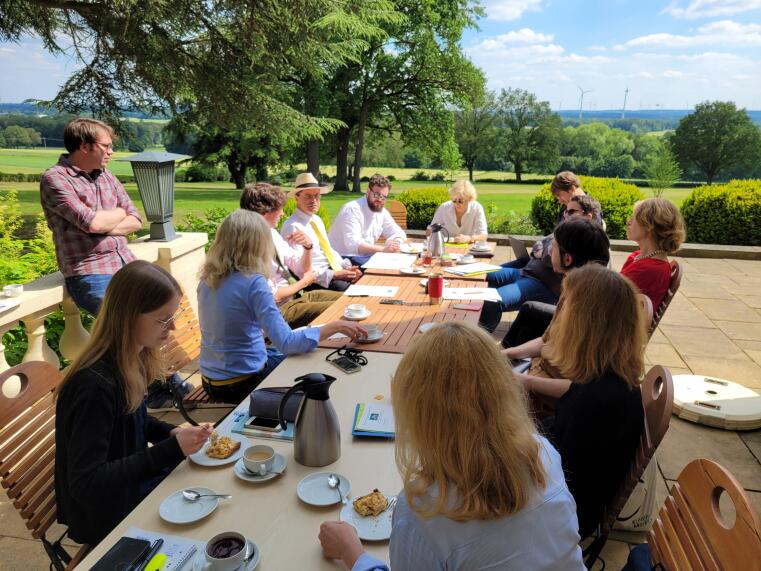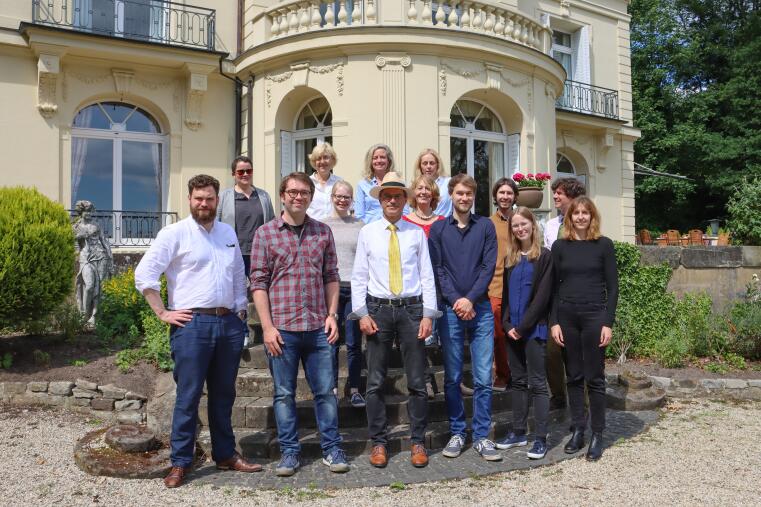Interdisciplinary understanding and diversity of perspectives
Report on the first internal workshop of the Käte Hamburger Kolleg at Landhaus Rothenberge on 2 and 3 June 2022
by Lennart Pieper
Do legal scholars and historians actually mean the same thing when they speak of legal pluralism? Can the idea of the source be transferred without further ado to other sciences such as anthropology? And what is a norm? Understanding across disciplinary boundaries was one of the recurring themes of the first internal workshop at the beginning of June, which was attended by the Käte Hamburger Kolleg’s Fellows, board of directors, and academic staff. The programme also saw discussion of two larger publication projects.
Located near Wettringen, the University of Münster’s Landhaus Rothenberge offered a location for two days that could not have been more beautiful. Built by a Dutch banking couple in the 1920s as a villa in the French rococo style, the building has been used by the University as a conference centre since 1962. The sunny weather meant that, shortly after arriving, participants could drink their coffee on the terrace, this leading seamlessly into the first open-air session. The view from up here of the Westmünster landscape helped with the process of brainstorming, and matched the blue-sky character of the discussions.

First on the agenda was putting together the source reader, which, as a handout for research and teaching, is intended to collect relevant source texts on the issue of legal unity and pluralism, and to classify and interpret them briefly. Since initial drafts for contributions were already available, the discussion could build on concrete proposals for texts. It quickly became clear that one of the most important challenges is to design the reader in a way that is appropriate for the target group. Closely related to this is the problem of dealing with the complexity of the subject matter, which a source reader can by no means treat exhaustively. Instead of working through epochs and regions, it might make more sense to focus on concrete problems and questions that recur across disciplines and time periods, and can be discussed using examples of sources. Such an approach would also bring to bear the Kolleg’s interdisciplinarity.
Another strength of the reader is its ability to provide orientation by placing contemporary phenomena in their historical contexts, these sometimes going back to antiquity. Such contextualisation shows that many supposedly current developments are much older or at least have already been discussed in a similar form in earlier societies, and makes possible a more informed approach to legal pluralism in the present.
Also discussed was the question of which language the publication should be in. After weighing up various options, participants soon decided on a multilingual publication, with all sources also being available in the original language to preserve proximity to the historical tradition. There was also agreement to publish the reader as an open access publication, thereby increasing its availability and visibility.

On the agenda for the following day was the project of a common glossary, which will bring together key terms and relevant concepts from the Kolleg’s research fields, and provide interested readers with a quick introduction to the issue of legal pluralism and unity. The glossary can also be used by future fellows to familiarise themselves quickly with the discussions that have taken place within the Kolleg so far.
The first contributions already available facilitated the discussions on the structure of the texts and were critically appraised in focused speed discussions. In order to structure the glossary, it was proposed to distinguish between basic conceptual terms (e.g. “legal pluralism”) and phenomena (e.g. “pardon”), this still being open to discussion. There was agreement on the necessity of always making the connection of all lemmas with the problem of legal unity and pluralism explicit. For example, it is not possible to treat a term such as “mercy” in all its facets (which would lead not least to the field of theology), but only as an exception to the regular application of existing law. Nevertheless, the aim must be to provide the most comprehensive explanations possible in all due brevity. There was also extensive debate on whether certain articles should be assigned more than once if different research opinions exist on the relevant issue. The workshop gave both publication projects a much more concrete form, and the editorial team will now continue the discussions.
As a place that brings together very different scholars, the Kolleg does not strive for unity, but thrives on the diversity of its Fellows and their disciplinary perspectives on the common research theme, making it all the more important for workshops such as this to lay the foundations for mutual understanding. This, in turn, was only possible thanks to the willingness on all sides to engage with new and perhaps initially unfamiliar perspectives, and thus arrive at new insights.
Besides the joint project work, the stay in Rothenberge also offered ample opportunity during the early summer evening walk or at the cosy get-together after dinner for participants to talk to each other personally and to get to know each other better. Alongside the benefits of exchanging ideas, the event therefore helped the Kolleg grow together. At the end, all participants said that they would like the event to happen again in the near future.
Impressions from Rothenberge






